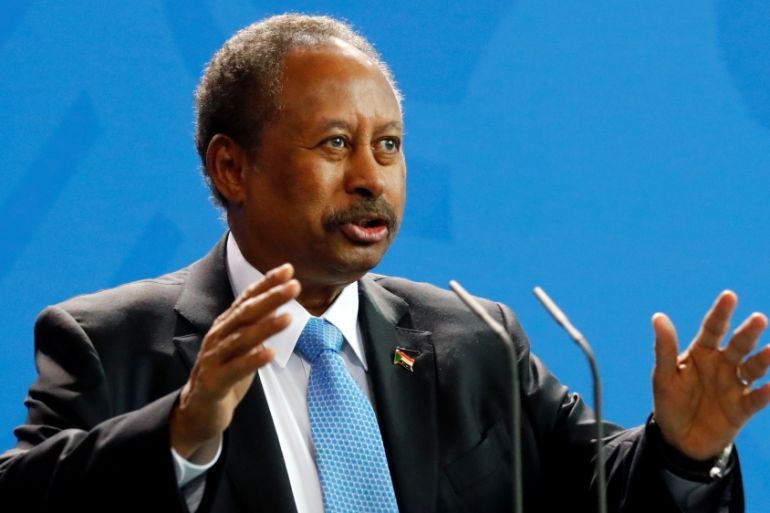Sudan’s PM sacks Kassala governor after unrest, port blockade
Sudan’s Prime Minister Abdulla Hamdok fired Saleh Ammar, a member of the Beni Amr tribe, following weeks of protests and clashes with the rival Beja tribe.

A provincial governor in eastern Sudan has been fired after deadly inter-tribal unrest in the region and a blockade of the country’s lifeline port, state news agency Suna said.
It said Prime Minister Abdalla Hamdok fired the governor of Kassala state, Saleh Ammar, a civilian and member of the Beni Amr tribe on Tuesday.
Keep reading
list of 4 itemsGo green or go home: Sudan’s climate opportunity
Hopes high for Sudan’s peace deal, but challenges remain
The Sudanese government cannot afford to be confused on Israel
Ammar was named governor of Kassala in July, when Hamdok appointed civilian governors for the country’s 18 provinces. The move was seen at the time as a key step forward in Sudan’s transition to democracy.
His appointment led to protests and clashes with the rival Beja tribe. He was barred from entering Kassala and remained in the capital, Khartoum, before the protests escalated in August leaving at least three dead and dozens more injured.
Tensions have since been running high in the region.
Port Sudan on the Red Sea port reopened last week after a three-day blockade by Beja protesters about an October 3 peace deal in which they said their tribe was sidelined.
The deal, ratified in the South Sudanese capital, Juba, was focused on resolving conflicts in the western Darfur region and southern states of Blue Nile and South Kordofan.
Groups from other regions also signed, but some in the east said the two factions that participated in the “eastern track” of the peace process do not represent political forces on the ground.
According to the Beja, the region’s representatives who signed the deal between rebel groups, political movements and the government came from the Beni Amer.
The peace deal has been hailed by the international community as a key milestone to ending decades of war in Sudan.
The African country is on a fragile path to democracy after a popular uprising led the military to overthrow former leader Omar al-Bashir in April 2019. A military-civilian government now rules the country, with elections possible in late 2022.
It is struggling to rebuild an economy beleaguered by decades of conflict and US sanctions.
Ammar had claimed, without offering evidence, that supporters of al-Bashir were behind the protests. The prime minister did not immediately name a replacement for Ammar.
Sharg al-Jabal clashes
Elsewhere in Sudan, more than 4,500 people in South Darfur province have been displaced in the past week by continuing clashes between factions of a rebel group boycotting a recent peace deal between the transitional government and a rebel alliance, according to the United Nations migration agency.
The fighting between factions of the Darfur-based Sudan Liberation Movement (SLM) group, led by Abdelwahid Mohamed al-Nour, erupted earlier this month in the Sharg al-Jabal area, the International Organization for Migration said.
The transitional government and the Sudan Revolutionary Front, a coalition of several armed groups, signed a peace deal earlier this month, capping torturous talks that had been under way in Juba since late last year.
Abdelwahid’s group rejects the transitional government and has not taken part in the talks. It criticised the deal, saying it was “not different from” other previous deals that did not end the wars.
Ending Sudan’s internal conflicts has been a top priority of the power-sharing government in power since last year’s military overthrow of al-Bashir.
The deal sets out terms to integrate rebels into the security forces, be politically represented and have economic and land rights.
Sudan’s largest single rebel group, the Sudan Liberation Movement-North, led by Abdelaziz al-Hilu, was involved in the talks but has yet to reach a deal with the government, reflecting the challenges still facing the peace process.
Al-Hilu has called for a secular state with no role for religion in lawmaking, the disbanding of al-Bashir’s militias and the revamping of the country’s military.
The group has said if its demands are not met, it would call for self-determination in areas it controls in the Blue Nile and South Kordofan provinces.
Jonas Horner, a senior Sudan analyst at the International Crisis Group think-tank, told Al Jazeera at the time of the deal signing that the two groups “are the only armed groups in Sudan with meaningful military capacity and who represent significant constituencies”, indicating that their absence renders the deal incomplete.